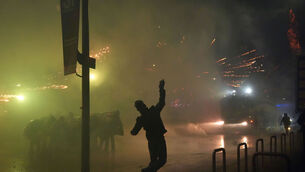Quest for the White House
PITY the presidential candidates who spend many millions of dollars and months crisscrossing Iowa’s thinly-populated landscape searching for supporters. Jimmy Carter, the first candidate to exploit Iowa, sometimes left notes on the doors of empty farmhouses saying he’d dropped by. The contenders are prospecting for those few hardy souls who will go out in sub-freezing temperatures on a January night and spend two or three hours in the local high-school auditorium casting — and then, sometimes changing — their votes.
“In Iowa, people are so nice they’ll tell you they’ll support you, but then they don’t show up,” says Wally Horn, the longest-serving Democratic state senator in Iowa. Even if they do, sometimes the bargaining is just beginning. Under the Democrats’ rules in Iowa, a candidate must collect at least 15% of the vote at a local caucus (party meeting) to be considered “viable”. If the votes fall short — entirely possible in a six or seven-person field — then the caucus-goers can switch their votes to another candidate, setting off a hectic round of horse trading and arm twisting and turning close contests into sudden runaways.














